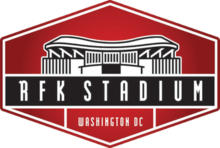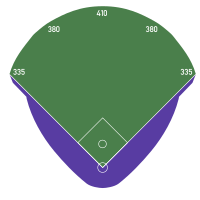
Back ملعب روبرت كينيدي التذكاري Arabic Estadi Robert F. Kennedy Memorial Catalan Robert F. Kennedy Memorial Stadium German Estadio Conmemorativo Robert F. Kennedy Spanish ورزشگاه یادبود رابرت اف. کندی Persian Robert F. Kennedy Memorial Stadium Finnish Robert F. Kennedy Memorial Stadium French אצטדיון רוברט קנדי ממוריאל HE Robert F. Kennedy Memorial Stadion Hungarian Stadion Memorial Robert F. Kennedy ID
RFK | |
 | |
 RFK Stadium with the U.S. Capitol and the Washington Monument visible in the background in 1988 | |
 | |
| Former names | District of Columbia Stadium (1961–1969) |
|---|---|
| Address | 2400 East Capitol Street SE |
| Location | Washington, D.C., U.S. |
| Coordinates | 38°53′24″N 76°58′19″W / 38.890°N 76.972°W |
| Public transit | |
| Owner | District of Columbia |
| Operator | Events DC |
| Capacity | Baseball: 43,500 (1961) 45,016 (1971) 45,596 (2005) Football or soccer: 56,692 (1961) 45,596 (2005–2019) 20,000 (2012–2017, MLS) |
| Field size | Football: 120 yd × 53.333 yd (110 m × 49 m) Soccer: 110 yd × 72 yd (101 m × 66 m) Baseball: Left field: 335 ft (102 m) Left-center: 380 ft (116 m) Center field: 410 ft (125 m) Right-center: 380 ft (116 m) Right field: 335 ft (102 m) Backstop: 54 ft (16 m)  |
| Surface | TifGrand Bermuda grass[1] |
| Construction | |
| Broke ground | July 8, 1960[2] |
| Opened | October 1, 1961 |
| Closed | September 15, 2019 |
| Demolished | 2023–present |
| Construction cost | $24 million ($245 million in 2023 dollars[3]) |
| Architect | George Leighton Dahl, Architects and Engineers, Inc. |
| Structural engineer | Osborn Engineering Company |
| Services engineer | Ewin Engineering Associates |
| General contractor | McCloskey and Co. |
| Tenants | |
| Washington Redskins (NFL) 1961–1996 George Washington Colonials (NCAA) 1961–1966 Washington Senators (MLB) 1962–1971 Washington Whips (USA / NASL) 1967–1968 Howard Bison (NCAA) 1974–1976 Washington Diplomats (NASL) 1974, 1977–1981 Team America (NASL) 1983 Washington Federals (USFL) 1983–1984 Washington Diplomats (ASL/APSL) 1988–1990 D.C. United (MLS) 1996–2017 Washington Freedom (WUSA) 2001–2003 Washington Nationals (MLB) 2005–2007 Military Bowl (NCAA) 2008–2012 | |
| Website | |
| eventsdc | |
Robert F. Kennedy Memorial Stadium, commonly known as RFK Stadium and originally known as District of Columbia Stadium, is a defunct multi-purpose stadium in Washington, D.C. It is located about two miles (3 km) due east of the U.S. Capitol building, near the west bank of the Anacostia River and next to the D.C. Armory. Opened in 1961, it was owned by the federal government until 1986.[4]
RFK Stadium was home to a National Football League (NFL) team, two Major League Baseball (MLB) teams, five professional soccer teams, two college football teams, a bowl game, and a USFL team. It hosted five NFC Championship games, two MLB All-Star Games, men's and women's World Cup matches, nine men's and women's first-round soccer games of the 1996 Olympics, three MLS Cup matches, two MLS All-Star games, and numerous American friendlies and World Cup qualifying matches. It hosted college football, college soccer, baseball exhibitions, boxing matches, a cycling race, an American Le Mans Series auto race, marathons, and dozens of major concerts and other events.
RFK was one of the first major stadiums designed to host both baseball and football. Although other stadiums already served this purpose, such as Cleveland Stadium (1931) and Baltimore's Memorial Stadium (1950), RFK was one of the first to employ what became known as the circular "cookie-cutter" design.
It is owned and operated by Events DC, the successor agency to the DC Armory Board, a quasi-public organization affiliated with the city government, under a lease that runs until 2038 from the National Park Service, which owns the land.[5]
In September 2019, Events DC officials announced plans to demolish the stadium due to maintenance costs.[6] In September 2020, the cost was estimated at $20 million.[7] Demolition of the surrounding area began in 2023, and on May 2, 2024, it was announced that the stadium was set to be demolished.[8] However, demolition of the stadium itself has not begun as of 2024.[9][10]
A bill to extend the lease by 99 years passed the House on February 28, 2024, and passed the Senate on December 21, 2024. This would give the Washington Commanders an option to return to Washington, D.C. to play in a rebuilt RFK Stadium after their lease at Northwest Stadium expires in 2027.[11]
Josh Harris, owner of the Washington Commanders, has stated that he expects the new RFK Stadium will be completed by 2030; Harris plans to have the Commanders return to the stadium as tenants following completion.[12][13][14][15]
- ^ "50 Years: Willie Leak maintains TifGrand bermudagrass at RFK Stadium". SportsTurf. November 30, 2001. Retrieved July 11, 2015.
- ^ "Robert F. Kennedy Memorial Stadium". Ballpark Tour. Archived from the original on April 6, 2013. Retrieved March 11, 2014.
- ^ 1634–1699: McCusker, J. J. (1997). How Much Is That in Real Money? A Historical Price Index for Use as a Deflator of Money Values in the Economy of the United States: Addenda et Corrigenda (PDF). American Antiquarian Society. 1700–1799: McCusker, J. J. (1992). How Much Is That in Real Money? A Historical Price Index for Use as a Deflator of Money Values in the Economy of the United States (PDF). American Antiquarian Society. 1800–present: Federal Reserve Bank of Minneapolis. "Consumer Price Index (estimate) 1800–". Retrieved February 29, 2024.
- ^ "District of Columbia gets RFK Stadium". Free Lance-Star. (Fredericksburg, Virginia). Associated Press. October 18, 1986. p. 11.
- ^ DeBonis, Mike (August 2, 2013). "City Will Study RFK Stadium Options in Wake of Soccer Deal". The Washington Post. Archived from the original on September 14, 2013. Retrieved September 30, 2013.
- ^ Cite error: The named reference
razewas invoked but never defined (see the help page). - ^ Cite error: The named reference
demolitionwas invoked but never defined (see the help page). - ^ Flynn, Meagan (May 2, 2024). "RFK Stadium officially set to be demolished". The Washington Post.
- ^ Beaujon, Andrew (April 26, 2023). "What's Next for RFK Stadium?". Washingtonian. Retrieved May 23, 2023.
- ^ Janezich, Larry (March 30, 2023). "Update on Demolition of RFK – Phase 3 Structural Demolition To Begin". Capitol Hill Corner. Retrieved May 23, 2023.
- ^ Flynn, Meagan (December 21, 2024). "Congress passes RFK bill in surprise move, giving D.C. control of stadium site". The Washington Post. Archived from the original on December 21, 2024. Retrieved December 21, 2024.
- ^ "H.R. 4984 (IH) - D.C. Robert F. Kennedy Memorial Stadium Campus Revitalization Act". GovInfo. U.S. Government Publishing Office. July 27, 2023. Retrieved November 23, 2023.
- ^ Segraves, Mark (September 20, 2023). "RFK Stadium site redevelopment advances, after House Oversight Committee drama". WRC-TV. Retrieved November 23, 2023.
- ^ "H.R.4984 - 118th Congress (2023-2024): D.C. Robert F. Kennedy Memorial Stadium Campus Revitalization Act | Congress.gov | Library of Congress". H.R.4984 - D.C. Robert F. Kennedy Memorial Stadium Campus Revitalization Act. Retrieved February 28, 2024.
- ^ "Senate passes RFK Stadium land bill, giving Commanders major off-the-field win". NFL.com. Associated Press. December 21, 2024. Retrieved December 21, 2024.

